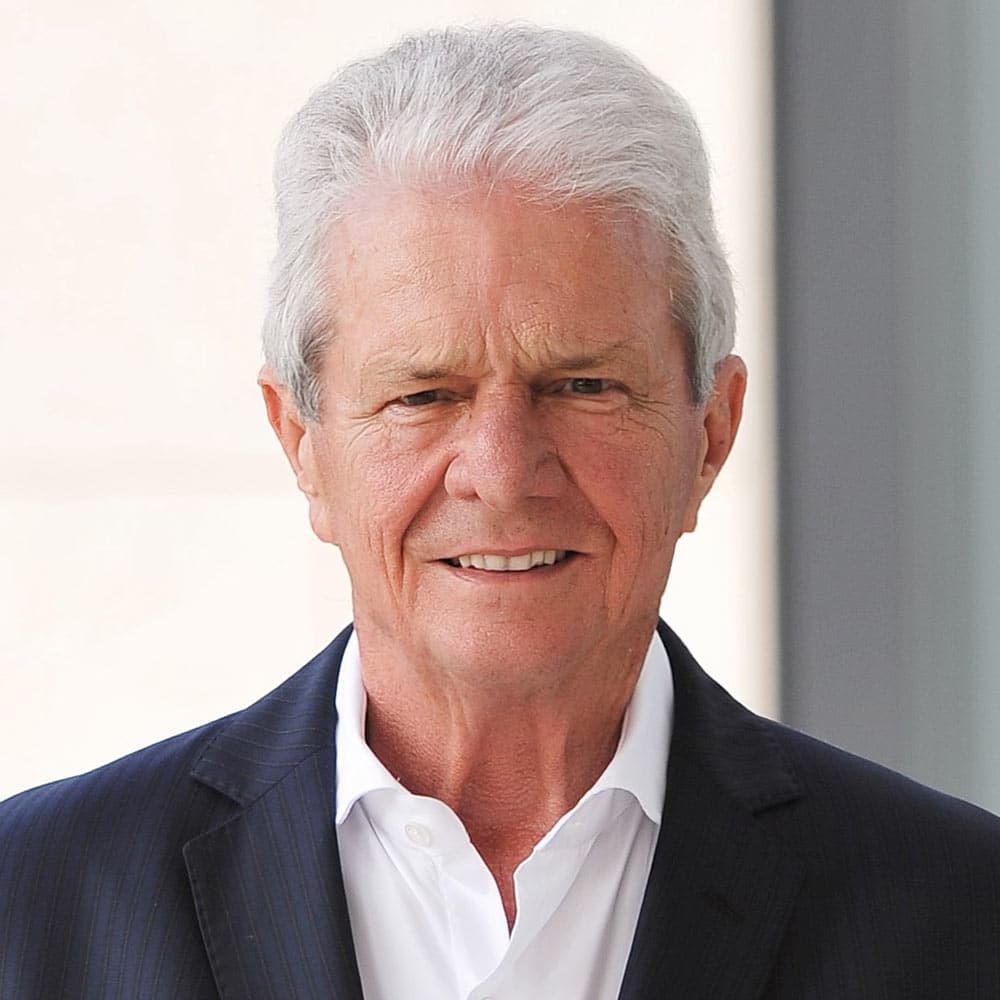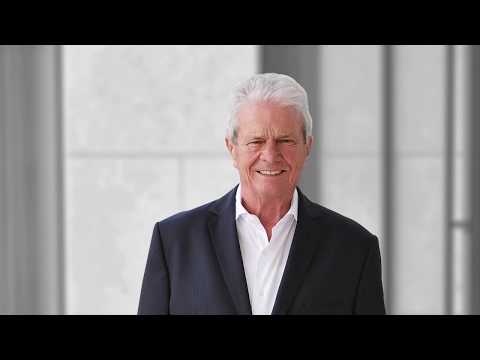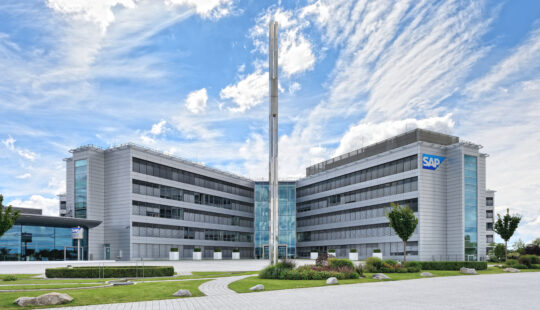A remarkable person is celebrating a landmark birthday. SAP Co-Founder, former CEO and Supervisory Board Chairman Dietmar Hopp turns 80 today. The values he holds dear still resonate at SAP.
 It’s May 11, 1998: Hundreds of blue balloons float skyward, the band strikes up a German schlager classic from the 1960s, many a colleague blinks back a tear or two. SAP employees are bidding farewell to Dietmar Hopp and his fellow SAP Co-Founder Klaus Tschira as they transfer from the Executive Board to the Supervisory Board.
It’s May 11, 1998: Hundreds of blue balloons float skyward, the band strikes up a German schlager classic from the 1960s, many a colleague blinks back a tear or two. SAP employees are bidding farewell to Dietmar Hopp and his fellow SAP Co-Founder Klaus Tschira as they transfer from the Executive Board to the Supervisory Board.
“It was an emotional day,” Hopp later says. Hasso Plattner pays a humorous tribute, joking that it was fortunate Hopp had always been able to tell the difference between gross and net, as he had spared his fellow co-founders many a sleepless night worrying about the fledgling company’s finances. Hopp, he adds, knew how to make the “big points” — he imbued the company with an unshakeable team spirit and he placed enormous trust in employees, encouraging them to take responsibility.
When Hopp stepped down from the Supervisory Board in 2005, Plattner was again full of praise: “Dietmar Hopp was the driving force in SAP’s journey – as a co-founder, Executive Board member, and Supervisory Board member. His expertise and his ability to motivate SAP employees were the hallmarks of his success at the helm of the company.”
Fifteen years on, Dietmar Hopp is now celebrating his 80th birthday. Once again, he will have no choice but to listen to the choruses of praise and expressions of thanks that will flood in from SAP and beyond.

It won’t just be SAP and its more than 100,000 employees congratulating the man who always had colleagues’ and customers’ best interests at heart, who shaped SAP and made its success possible in the first place. The Rhine-Neckar Metropolitan Region will also wish to honor one of its foremost philanthropists: Hopp’s place in history is already secure, thanks to his generous donations to causes devoted to the welfare of children, young people, and the elderly as well as to medicine, education, climate protection, and sport.
Respect for a “True Leader”
Ask any SAP employee past or present about Dietmar Hopp and they’ll overwhelming speak of their enormous respect for him: respect for a man whose vision, courage, eye for the possible, and skill in inspiring employees and placing trust in them formed the bedrock of his reputation as a gifted manager. “He was a leader – simple as that,” says one former colleague.
“That’s much too kind,” will probably be Hopp’s modest reply, pointing once again to a “team success.” But it’s no coincidence that those who worked with him still accord pride of place in their memories to the man affectionately known as Vadder Hopp (Papa Hopp). And no one would dispute that in the early days it was Dietmar Hopp who led the way in establishing the behaviors and attitudes — the culture — that still characterize SAP today, despite all the changes that have taken place since.
It was not by reading guidebooks for managers that he found his moral compass and became a responsible and compassionate business leader who never lost touch with reality. These virtues formed out of his experiences as a child and young adult, and out of the values his parents instilled in him.
Dietmar Hopp was born in Heidelberg in 1940, the youngest of four children. His family lived in nearby Hoffenheim, in the rural Kraichgau region. His father was a teacher, his mother a housewife. Deprivation and “doing without” were a familiar theme for the family. And even when World War II ended, leaving the family – visibly at least – unscathed, there was not much to go around. The young Dietmar earned a little cash by collecting scrap iron. He did well at school, exceling in science subjects.
Soccer also played an important role in his life. At 17, Hopp was called up to play for TSG Hoffenheim’s first team. The rewards were not financial; the young striker received a can of liver sausage from a local farmer for every goal he scored.
A Desire for Prosperity
Hopp developed an appetite for success and financial independence at an early age. He gave private tuition in math and after graduating from high school in 1960 sold garage doors to people eagerly building their own homes as Germany’s economic miracle continued. Having rejected a teaching career as “not offering sufficient financial appeal,” he elected to study electrical engineering, specializing in telecommunications technology, at the then University of Karlsruhe, Germany. “I really was driven by the desire to earn money, so I went where I thought the demand for people was greatest and where the best opportunities were,” he says.
Hopp graduated as an engineer in 1965 and applied to work for IBM because he knew they “paid the most.” After completing 18 months of basic training at the U.S. computer market leader, he began his career as a system consultant at the company’s Mannheim office in 1966.
On his visits to customer sites, Hopp observed that companies were frequently struggling with similar difficulties. In 1971, he was tasked with modernizing the order processing and shipping control systems at the nylon fiber plant of UK chemicals group ICI in nearby Östringen. With him was his assistant, Hasso Plattner. Over the course of nine months, they developed a system that “processed entries in real time,” says Hopp. And, over that period, both Hopp and Plattner became convinced that the future of enterprise data processing lay in standard programs that integrate business processes.
To make their vision a reality, they decided to go it alone, founding Systemanalyse Programmentwicklung (later SAP) with their IBM peers Claus Wellenreuther, Klaus Tschira, and Hans-Werner Hector on April 1, 1972. It was the start of an international success story whose early chapters were largely written by Dietmar Hopp.
Programmer, Salesman, Captain
Hopp and his colleagues programmed the “R System” and its successor, “R/2” for an initial group of customers that included ICI, Knoll, and Schott. As a Dialog programming specialist, Hopp also became the newly founded company’s top salesman. For him, a potential customer’s “no” was merely the precursor to a “yes.”
From the outset, Hopp took on the role of team captain, ensuring that his players worked together as a unit and stuck to the same game plan. Later, Plattner would often refer to “Hopp’s great ability to run the place like he was managing a soccer club.”
Hopp believed employees could only grow and produce innovative ideas if you trusted them and allowed them to make mistakes. He placed immense value on establishing a company culture characterized by openness, a readiness to help, a sense of responsibility, a strong desire to learn, and the determination never to let customers down. He despised arrogance, selfishness, and hierarchical thinking. “We never consciously defined a culture; we let our actions do the talking,” he said when leaving the Executive Board in 1998.
When SAP went public in 1988, Hopp became CEO of SAP AG. He was responsible for development and sales, consulting at national and international level, management, public relations, and press work.
From 1997, he shared the role of CEO with Hasso Plattner, stepping down from the Executive Board in 1998 to join the SAP Supervisory Board as its chairperson, an office he held until 2003, before finally stepping down from the Supervisory Board in 2005.
Investor and Philanthropist
Since withdrawing from operational business at SAP, Hopp has, among his many activities, been active as an investor, notably in the biotech industry. Never a particularly keen traveler, he is also conscious of the debt he owes to his home region, the birthplace of SAP.
“This community and its people empowered me to achieve what I did, and I want to give something back,” he says. He is not interested in status symbols. It is his firm belief that while “ownership comes with certain obligations, wealth comes with even more.”
In 1995, he established the Dietmar-Hopp-Stiftung, now one of Europe’s largest private charitable foundations and a staunch supporter of sporting, medical, social, and educational causes focused mainly in the Rhine-Neckar Metropolitan Region. To date, the foundation has donated around €800 million. “I get a great sense of satisfaction from working with the foundation,” says Hopp. “It’s an amazing feeling to be able to help.”
Encouraging and supporting young people has always been a cause close to his heart. In 2001, he founded Anpfiff ins Leben, an organization that aims to offer children and young people participating in sports at all levels better opportunities at school, in their vocational training, and in their working lives.
Hopp was and still is a passionate athlete; a keen soccer and tennis player in the past, he now uses a treadmill to keep fit. And golf still provides an outlet for his competitive energy. He founded the St. Leon-Rot Golf Club in 1997.
Hopp also supports his local soccer team, TSG 1899 Hoffenheim. Since he began investing in the club in 1990, it has risen all the way from a district league to the Bundesliga.
Dietmar Hopp has not held an official position at SAP for 15 years. But he knows exactly what’s happening there. With more than 100,000 employees, SAP bears little resemblance to the company he left in 2005.
Much has changed, but anyone who has been involved with the company over the years and at various locations senses that the unifying spirit its co-founder inspired lives on: teamwork and innovation, openness and respect, trust, a willingness to take responsibility and to do everything possible to help customers and colleagues when they need advice and support.
You might say it’s the “Dietmar Hopp spirit.”



